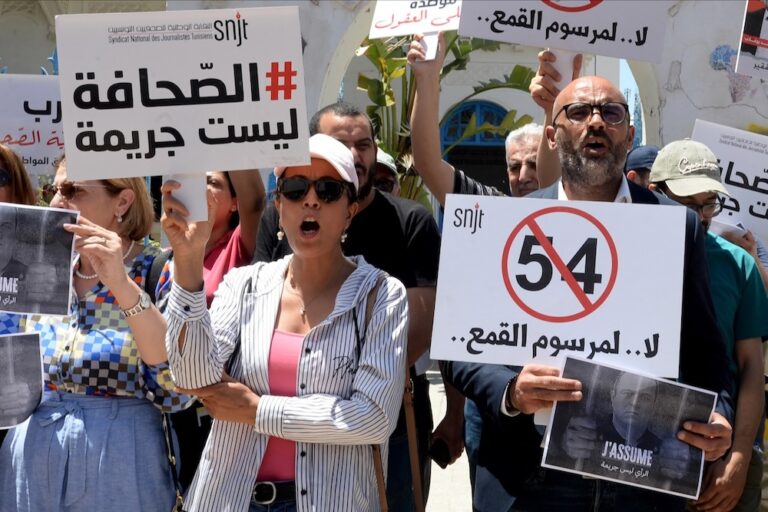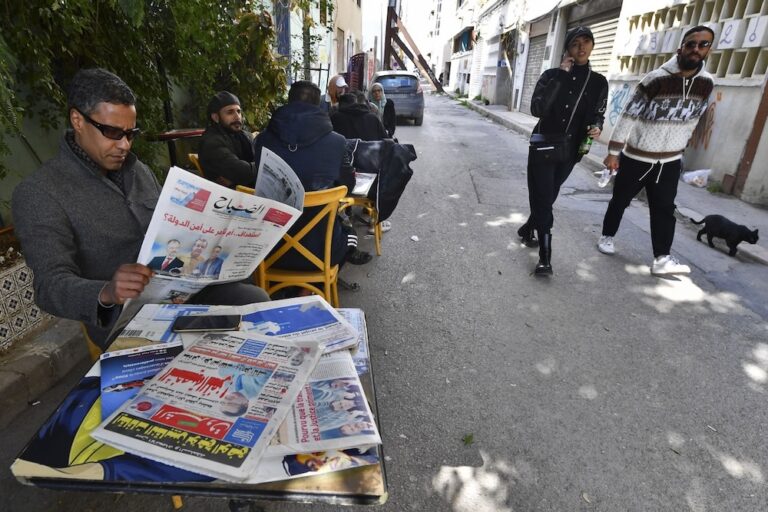In a letter, Samir Feriani named high-level interior ministry officials whom he said bore responsibility for killing protesters during the revolution.
(Human Rights Watch/IFEX) – Tunis, June 9, 2011 – Tunisian authorities should free the police officer Samir Feriani from military detention and drop any charges that are based solely on his whistle-blowing efforts and transfer any other charges to a civilian court, Human Rights Watch said today. Feriani is a high-ranking officer who runs a program for training officers in the interior ministry.
Feriani has been in custody since May 29, 2011, after writing a letter to Interior Minister Habib Essid that named current high-level ministry officials whom he said bore responsibility for killing protesters during the Tunisian revolution, as well as for other human rights abuses. Feriani’s letter also charged that ministry officials have been destroying sensitive archives following the ouster of President Zine el-Abidine Ben Ali on January 14.
“At a time when many Tunisians believe that the officials who terrorized people under Ben Ali remain strong within the security establishment, the provisional government should be encouraging whistle-blowers, not using the ousted government’s discredited laws to imprison them,” said Sarah Leah Whitson, Middle East and North Africa director at Human Rights Watch.
Feriani’s letter asserted that on January 20, ministry cars went to a location housing ministry archives and officers destroyed papers and cassettes, one of his defense lawyers, Samir Ben Amor, who read the letter, told Human Rights Watch. Feriani contended that the material targeted for destruction included archives of the Palestine Liberation Organization (PLO) that, he said, documented Ben Ali’s relations with the Mossad, the Israeli intelligence agency. The PLO was headquartered in Tunis from 1982 to 1994.
After first addressing the interior minister, Feriani then addressed his accusations to the office of Prime Minister Béji Caïd Essebsi, Ben Amor said. Shortly before his arrest, two independent Tunisian newspapers, El Khabir (The Expert) and l’Audace (The Bold One), had begun reporting on Feriani’s accusations.
A military court investigative judge is investigating Feriani on charges under the penal code of “harming the external security of the state,” distributing information “likely to harm public order,” and “accusing, without proof, a public agent of violating the law” (respectively, penal code articles 61, 121(3), and 128), another one of his lawyers, Mohamed Abbou, told Human Rights Watch.
Feriani has been detained at the Aouina military barracks near Tunis since the morning of May 29, when plainclothes policemen intercepted him as he was driving near his home in Bardo, outside Tunis. Authorities did not formally notify his family of his arrest until the following morning, his wife, Leila Feriani, told Human Rights Watch.
Feriani has been referred to a military rather than civilian court both because of his status as a police officer and the nature of the charges. In contrast to the civilian courts, the military court verdicts are subject to no appeal on the facts. A defendant can refer a military court verdict only to the Court of Cassation, which can annul a verdict only on the grounds of error in procedure or in application of the law.
( . . . )


